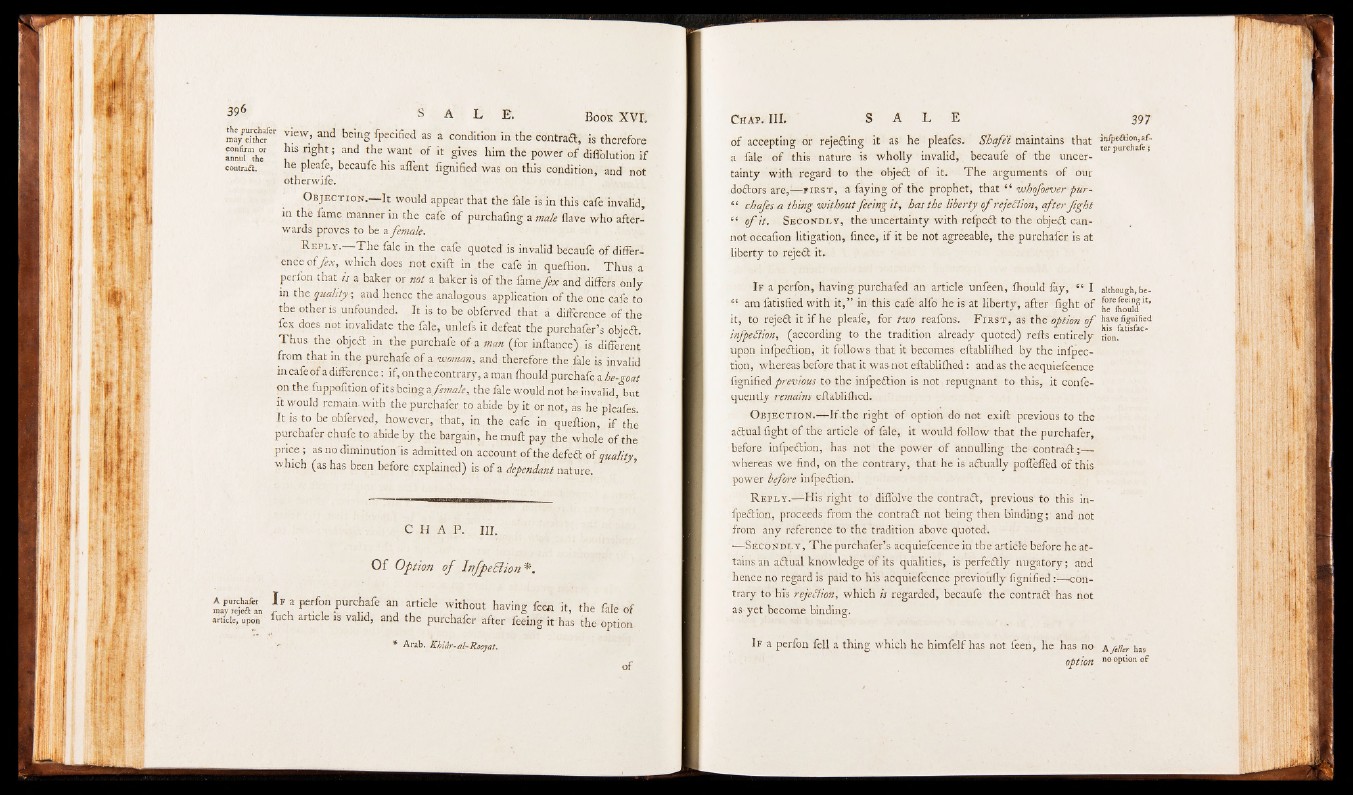
the purchafer
may either
confirm or
annul the
contra#.
A purchafer
may reje# an
article, upon
view, and being fpecified as a condition in the contradt, is therefore
his right; and the want of it gives him the power of diffolution if
he pleafe, becaufe his affent fignified was on this condition, and not
otherwife.
Objection.— It would appear that the fale is in this cafe invalid,
in the fame manner in the cafe of purchafing a male Have who afterwards
proves to be a female. .
R eply.— The fale in the cafe quoted is invalid becaufe of differi
ence o ffex, which does not exift in the cafe in queftion. Thus a
perfon that is a baker or not a baker is of the fame fex and differs only
in th equality, and hence the analogous, application of the. one cafe to
tbeother is unfounded. It is to be obferved that a difference of the
fex does not invalidate the fal'e, unlefs it'defeat the purchafer’s object.
Thus the objedt in the purchafe of a man (for inftance) is different
from that in the purchafe of a. woman, and therefore the fale is invalid
in cafe of a difference: if, on the contrary,' a man fhould purchafe a.,he-goat
on the fuppofition of its being is female,, the fale would not be invalid, but
it would remain, with the purchafer to abide by it or not, as he pleafes.
It.is to be obferved, however, that, in the cafe in queftion, if the
purchafer chufe to abide by the bargain, he mull pay the whole of the
price ; as no diminution'is admitted on account of the defedt of quality,
which (as has been before explained) is of a dependant nature.
C H A P . III.
O f Option of hfpeciion *.
I f a perfon purchafe an article without having feen it the fale of
fuch article g valid, and the purchafer after feeing it has the option
Arab. Kkiar-al-Rooyat.
of
of accepting or rejedting it as he pleafes. Shafei maintains that
a fale of this nature is wholly invalid, becaufe of the uncertainty
with regard to the object of it. The arguments of our
dodtors are,-1—first, a faying of the prophet, that “ whofoever pur-
“ chafes a thing without feeing it, has the liberty ofrejection, afterfght
“ o f it. Secondly, the uncertainty with refpedt to the objedt cannot
occafion litigation, fince, if it be not agreeable, the purchafer. is at
liberty to rejedt it.
I f a perfon, having purchafed an article unfeen, fhould lay, “ I
“ am fatisfied with it,” in this cafe alfo he is at liberty, after fight of
it, to rejedt it if he pleafe, for two reafons., F irst, as the option o f
infpellion, (according to the tradition already quoted) refts entirely
upon infpedtion, it follows that it becomes1 eftablilhed by the inflection,
whereas before that it was not eftablilhed: and as the acquiefcence
fignified previous to the infpedtion is not repugnant to this, it confe-
quently remains eftablilhed.
Objection.—If .the right of option do not exift previous to the
adtual fight of the article of fale, it would follow that the purchafer,
before infpedtion, has not the power of annulling the contradt;—
whereas we find, on the contrary, that he is adtually poflefled of this
power before infpedtion.
R eply.—-His right to diflolve the contradt, previous to this infpedtion,
proceeds from the contradt not being then binding; and not
from any reference to the tradition above quoted.
—Secondly, The purchafetls acquiefcence in the article before he attains
an adtual knowledge of its qualities, is perfedtly nugatory; and
hence no regard is paid to his;acquiefoence previoufiy fignified :—contrary
to his rejection, which is regarded, becaufe the contradt has not
as-yet become binding.
If a perfon fell a thing which he himfelf has not feeri, he has no
option
in/pe#ion, after
purchafe ;
although, before
feeing it,
he fhould
have fignified
his fatisfac-
tion.
A feller has-
no option of